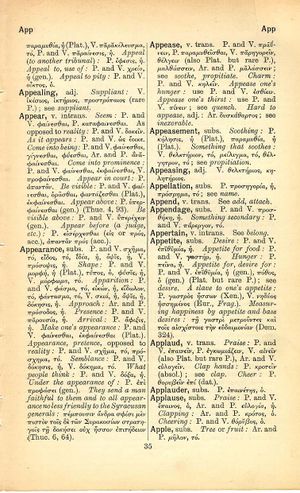appetite: Difference between revisions
From LSJ
ἔκστασίς τίς ἐστιν ἐν τῇ γενέσει τὸ παρὰ φύσιν τοῦ κατὰ φύσιν → what is contrary to nature is any developmental aberration from what is in accord with nature (Aristotle, On the Heavens 286a19)
m (Text replacement - "<b class="b2">Frag.</b>" to "''Frag.''") |
mNo edit summary |
||
| Line 2: | Line 2: | ||
|Text=[[File:woodhouse_35.jpg|thumb|link={{filepath:woodhouse_35.jpg}}]]'''subs.''' | |Text=[[File:woodhouse_35.jpg|thumb|link={{filepath:woodhouse_35.jpg}}]]'''subs.''' | ||
[[desire]]: P. and V. [[ἐπιθυμία]], ἡ. | |||
[[appetite]] for [[food]]: P. and V. [[γαστήρ]], ἡ. | |||
[[hunger]]: P. [[πεῖνα]], ἡ. | |||
<b class="b2">Appetite for, desire for</b>: P. and V. [[ἐπιθυμία]], ἡ (gen.), [[πόθος]], ὁ (gen.) (Plat. but rare P.); see [[desire]]. | <b class="b2">Appetite for, desire for</b>: P. and V. [[ἐπιθυμία]], ἡ (gen.), [[πόθος]], ὁ (gen.) (Plat. but rare P.); see [[desire]]. | ||
Revision as of 09:24, 15 August 2017
English > Greek (Woodhouse)
subs.
desire: P. and V. ἐπιθυμία, ἡ.
appetite for food: P. and V. γαστήρ, ἡ.
Appetite for, desire for: P. and V. ἐπιθυμία, ἡ (gen.), πόθος, ὁ (gen.) (Plat. but rare P.); see desire.
A slave to one's appetite: P. γαστρὸς ἥσσων (Xen.), V. νηδύος ἡσσημένος (Eur., Frag.).
Measuring happiness by appetite and base desires: τῇ γαστρὶ μετροῦντες καὶ τοῖς αἰσχίστοις τὴν εὐδαιμονίαν (Dem. 324).

